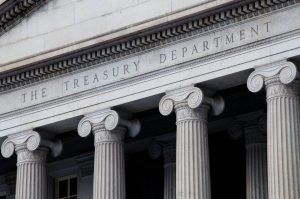State of the Economy and Gold: Leading Economic Indicators Signal Recession
Posted onAs the economic data turns south, investors are rushing into gold and silver – favored safe-haven assets in an economic downturn. Gold charged out the starting gates in recent months, climbing at a dizzying pace. While gold vaulted a breathtaking 18.8% from its October 2022 low to the January high, silver is also showing a double digit increase – with a 21% gain over the past three months. Here’s what we are seeing in the economy now.
LEI warns recession is imminent
In December, the Conference Board’s Leading Economic Indicators (LEI) fell for the 10th month in a row – signaling a recession ahead. The 1% decline in December was driven by weaker new orders and shorter average workweeks which spelled weakness for the economy ahead.
What is the LEI? The LEI is made up of 10 indicators that cover a wide range of economic activity, including job growth, housing construction, and stock prices. The LEI can be used to predict turning points in the business cycle and is considered a predictor of turning points because it includes a consensus of forward-looking indicators from different areas of the economy.
“The U.S. LEI fell sharply again in December – continuing to signal recession for the U.S. economy in the near term,” Ataman Ozyildirim, the Conference Board’s senior director for economics, said in a statement.
What this means for gold: Expect gold and silver to continue to climb in this environment. “Gold and silver are go-to assets when traders are bearish on stocks and the economy,” David Russell, VP of market intelligence at TradeStation told FOX Business. “Both metals could also benefit from a recession and the Fed halting interest-rate hikes,” Russell added.
Consumers spend less
December retail sales fell over 1%, driven by weaker spending on autos and gas. Consumers are hamstrung by still-high inflation, rising interest rates and a weakening labor market – with mass layoffs occurring at major corporations including Google, Spotify, Microsoft, Amazon and Meta.
“With the war in Ukraine and all the world in, or entering into recession, their companies are trenching as demand is falling, belt tightening is going on,” John Van Reenen, the Ronald Coase School Professor at the London School of Economics told Time magazine.
What this means for gold: Weakening retail sales is another sign that economic growth is slowing and a recession is around the corner. Weaker retail sales will also translate into lower corporate earnings, which will continue to pressure the stock market. Gold is a non-correlated asset to the stock market and when stocks go down, gold typically climbs.
Debt ceiling could trigger global financial crisis – if Congress fails to increase the limit
In late January, the United States government hit its current $31.4 trillion debt ceiling limit set by Congress. Now, the Treasury Department is resorting to so-called “extraordinary measures” to continue paying America’s bills including interest payments on Treasury security debt, Social Security checks and the U.S. military troop’s paychecks.
The debt ceiling includes obligations that Congress has already approved. Now, the Treasury is backed into a corner trying to find a way to pay its bills, until Congress increases the debt limit.
While politicians in Washington D.C. are turning this event into a political football, in fact, the U.S. debt ceiling has been raised over 70 times since 1960, under both Democrat and Republican presidents.
While politicians want to force a debate on future spending, in order to raise the debt ceiling, if the Treasury were to default on our debt – it could trigger a global financial crisis, U.S. Treasury Secretary Janet Yellen warned. She added it would mean borrowing costs would rise sharply for all Americans, it would cause a U.S. recession, global financial crisis and the U.S. dollar would lose its reserve currency status.
What this means for gold: Gold could easily climb to new all-time highs – as it did in 2011, the last time Congress played political football with our nation’s full faith and credit in the dollar and Treasury securities.
If you have questions about the state of the economy or would like to discuss how you can protect your wealth in the current environment, talk to a Blanchard portfolio manager today. We have been helping clients grow and preserve their wealth through diversification into tangible assets since 1975 and we can help you too.
Want to read more? Subscribe to the Blanchard Newsletter and get our tales from the vault, our favorite stories from around the world and the latest tangible assets news delivered to your inbox weekly.







